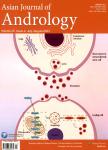The role of the molecular chaperone heat shock protein A2 (HSPA2) in regulating human sperm-egg recognition
The role of the molecular chaperone heat shock protein A2 (HSPA2) in regulating human sperm-egg recognition作者机构:priority Research Centre in Reproductive Science School of Environmental and Life Sciences Discipline of Biological Sciences University of Newcastle CallaghanNSW 2308 Australia Priority Research Centre in Chemical Biology School of Environmental and Life Sciences Discipline of Biological Sciences University of NewcastleCallaghan NSW 2308 Australia Hunter Cancer Research Alliance School of Biomedical Sciences and Pharmacy Faculty of Health and Medicine NSW Australia
出 版 物:《Asian Journal of Andrology》 (亚洲男性学杂志(英文版))
年 卷 期:2015年第17卷第4期
页 面:568-573页
核心收录:
学科分类:0710[理学-生物学] 071010[理学-生物化学与分子生物学] 081704[工学-应用化学] 07[理学] 08[工学] 0817[工学-化学工程与技术] 0905[农学-畜牧学] 09[农学] 090501[农学-动物遗传育种与繁殖]
主 题:egg fertilization heat shock protein A2 molecular chaperone sperm sperm-egg interactions
摘 要:One of the most common lesions present in the spermatozoa of human infertility patients is an idiopathic failure of sperm-egg recognition. Although this unique cellular interaction can now be readily by-passed by assisted reproductive strategies such as intracytoplasmic sperm injection (ICSI), recent large-scale epidemiological studies have encouraged the cautious use of this technology and highlighted the need for further research into the mechanisms responsible for defective sperm-egg recognition. Previous work in this field has established that the sperm domains responsible for oocyte interaction are formed during spermatogenesis prior to being dynamically modified during epididymal maturation and capacitation in female reproductive tract. While the factors responsible for the regulation of these sequential maturational events are undoubtedly complex, emerging research has identified the molecular chaperone, heat shock protein A2 (HSPA2), as a key regulator of these events in human spermatozoa. HSPA2 is a testis-enriched member of the 70 kDa heat shock protein family that promotes the folding, transport, and assembly of protein complexes and has been positively correlated with in vitro fertilization (IVF) success. Furthermore, reduced expression of HSPA2 from the human sperm proteome leads to an impaired capacity for cumulus matrix dispersal, sperm-egg recognition and fertilization following both IVF and ICSI. In this review, we consider the evidence supporting the role of HSPA2 in sperm function and explore the potential mechanisms by which it is depleted in the spermatozoa of infertile patients. Such information offers novel insights into the molecular mechanisms governing sperm function.



